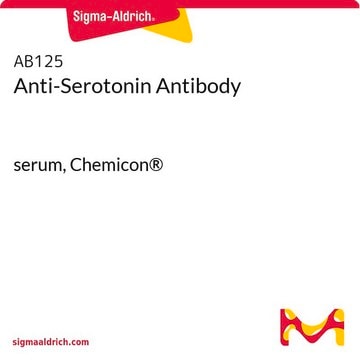MAB352
Anti-Serotonin Antibody, clone YC5/45
culture supernatant, clone YC5/45, Chemicon®
Synonym(s):
5-HT
About This Item
Recommended Products
biological source
rat
Quality Level
antibody form
culture supernatant
antibody product type
primary antibodies
clone
YC5/45, monoclonal
species reactivity
mouse, human, rat, lizard, rabbit, pig
manufacturer/tradename
Chemicon®
technique(s)
immunohistochemistry: suitable
isotype
IgG
shipped in
dry ice
target post-translational modification
unmodified
Gene Information
human ... HTR1A(3350)
Specificity
Immunogen
Application
Optimal working dilutions must be determined by the end user.
Neuroscience
Neurotransmitters & Receptors
Physical form
Storage and Stability
Analysis Note
Brain tissue
Other Notes
Legal Information
Disclaimer
Not finding the right product?
Try our Product Selector Tool.
Signal Word
Warning
Hazard Statements
Precautionary Statements
Hazard Classifications
Eye Irrit. 2 - Skin Irrit. 2
Storage Class Code
11 - Combustible Solids
WGK
WGK 2
Certificates of Analysis (COA)
Search for Certificates of Analysis (COA) by entering the products Lot/Batch Number. Lot and Batch Numbers can be found on a product’s label following the words ‘Lot’ or ‘Batch’.
Already Own This Product?
Find documentation for the products that you have recently purchased in the Document Library.
Our team of scientists has experience in all areas of research including Life Science, Material Science, Chemical Synthesis, Chromatography, Analytical and many others.
Contact Technical Service









